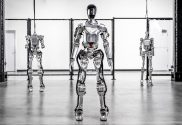Guest author Chris Haroun is a venture capitalist at ARTIS Ventures, an award-winning business school professor, and the author of 101 Crucial Lessons They Don’t Teach You In Business School.
It has been 30 years since the first Back to the Future movie was released. I watched it recently with my kids, and was amazed how little vehicles have changed over the years.
In the film, you get a glimpse of what the future will look like in 2015 with a flying car. How is it possible that cars haven’t seen a material life improvement since 1985? I am confident that 30 years from today, all cars will have a self-driving option and that, in 10 years, most will. (Our grandchildren will remark about how unproductive we must have been.)
We tend to overestimate what we can accomplish in a year, and underestimate what we can accomplish in a decade. Just think—in 2007, with just one screen in the palm of your hand, Apple reinvented the phone, while Google made sure the operating system was virtually free and accessible to the masses.
Those technologies have been pivotal and have changed lives. It’s now time to reinvent the automobile experience. It’s an exciting time for the tech giants, as they duke it out in this new platform holy war, as well as startups and other tech businesses, too.
Benefits Of Self-Driving Cars Go Beyond Transportation
There are many potential long-term benefits to self-driving cars—ranging from environmental, safety, health, family-life balance, geopolitical and overall economic benefits.
The safety benefits will likely be material, as this will result in fewer accidents. Fewer accidents would result in less traffic and, in turn, less pollution; the environmental benefit then would be significant.
The economic benefits may be noteworthy as well—even potentially as deflationary as Amazon Web Services is today, or the fall of the Berlin Wall was in 1989. If we spend less money on fuel and repairs, then we can be less reliant on the oil sector. From a geopolitical perspective, that may mean less funds ultimately going to rogue nations with malicious, militant intentions.
Self-driving cars could also be materially beneficial to lowering inflation, since we would probably mean we’d spend less on gas and repairs. It may have an impact on real estate as well. We’d be better able to commute from cheaper neighborhoods to our jobs in the cities, as there would be fewer accidents slowing traffic and less time wasted traveling from work or school.
The Ultimate Time Creator
Self-driving cars may be the ultimate time creator, offering benefits both direct and indirect. They may allow us more time to spend with our families, exercising or sleeping. The result is a more balanced, healthy and happy existence. Anybody who disagrees should spend try driving in Los Angeles during rush hour.
In a way, using self-driving cars may be like adding hours to our day, because we’d have the option to work in our cars during the trip. The notion of productivity in commute could touch other areas of life as well. We could use the time to study, which personally resonates for me, because I have always believed education can fix almost all of the world’s problems. We just might see a domino effect of positive after positive.
A Software Gold Rush
With so many benefits at stake, it seems like a certainty that we’ll see a software startup gold rush before long. Companies are likely to duke it out to develop the hottest auto operating system and apps to run on it.
Considering that Microsoft, maker of the dominant Windows desktop platform, missed out on mobile, I believe CEO Satya Nadella will be in hot pursuit of autonomous cars. I expect he’ll use part of the company’s annual $10 billion research and development effort on exploring an auto software platform. Microsoft tried to do this under Bill Gates with the Auto PC product—which, similar to Apple’s Newton, was way too early and couldn’t gain market acceptance. But the future is now.
What About The Risks?
Yes, there are risks to self-driving cars, but they are no greater than what we face every time we get behind the wheel. In fact, there’s plenty to suggest they will reduce our risk of harm.
Today, an estimated 94% of auto accidents are due to human error. While autonomous vehicles may not be perfect yet—in fact, they are obviously still in development and unproven on a mass scale—they hold great potential to save innumerable lives. We’ve already seen improvements: Google, for its part, has been working hard on minimizing accidents with its self-driving car efforts. The margin of error will be even lower still, as auto-based software algorithms and artificial intelligence systems advance.
Google and Apple are clearly gunning for the lead in the automobile operating system of the future, competing with Tesla for auto engineering talent. This new platform holy war will lead to significant saber rattling between the companies, but competition breeds innovation. In other words, after so many stops and starts, we might just see the industry finally hitting the acceleration.





